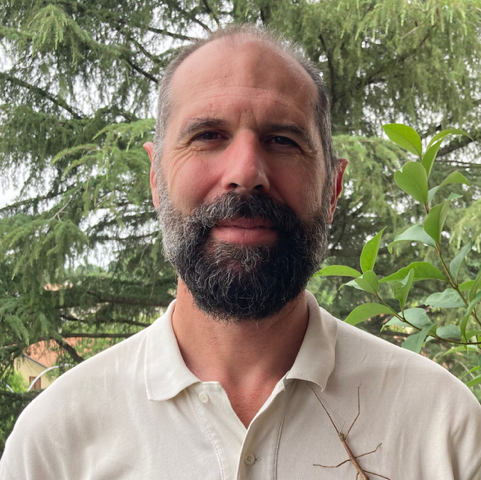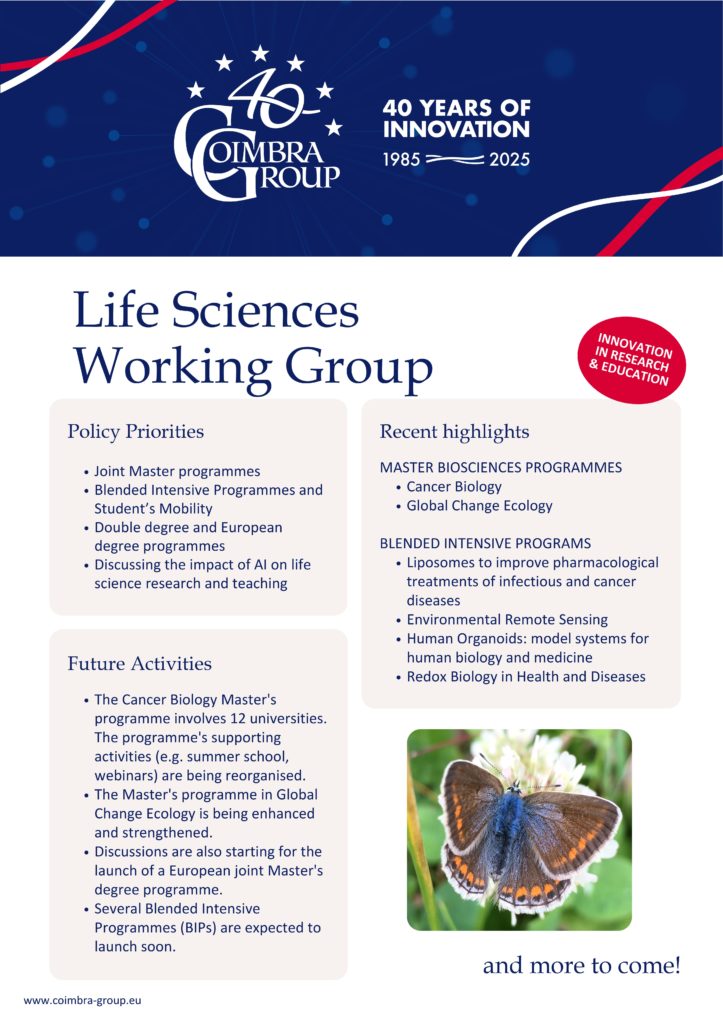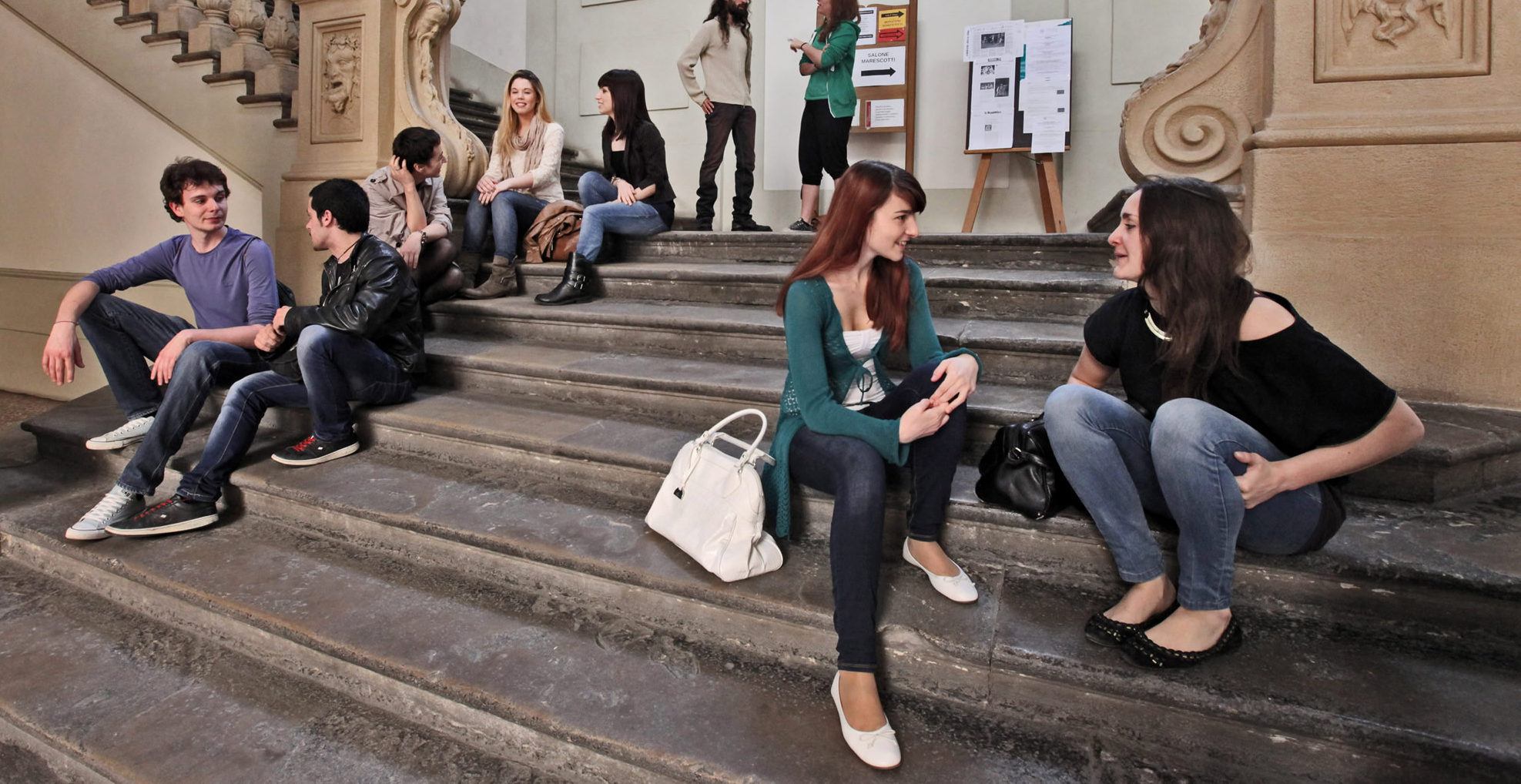Life Sciences
Working Group
Chair: Lino Ometto

Lino Ometto holds the position of Associate Professor of Zoology at the Department of Biology and Biotechnology of the University of Pavia. He grew up with a keen interest in animals and he likes to think of himself as a zoologist with a sweep net in one hand and a genome in the other. His research interests are aimed at better understanding the origin of adaptive traits in insects (& friends) using population genetics and molecular evolution approaches. After graduating in Biology from the University of Padova, he obtained his Ph.D. in Natural Sciences from the Ludwig-Maximilians University of Munich under the supervision of Wolfgang Stephan. He then studied the evolution of gene expression in ants in Laurent Keller’s lab at the University of Lausanne. He has always enjoyed sharing his passion and interests with students and people in general, and he is regularly involved in outreach initiatives. He is president of the Italian Society for Evolutionary Biology.
Vice-Chair: Marta Camps Camprubí

Dr. Marta Camps Camprubí is Associate Professor in Biochemistry and Vice-Dean for international relations and student mobility of the Faculty of Biology, University of Barcelona. She has been in charge of the student mobility at Faculty of Biology from 2009. Her research interests and expertise cover adipose tissue, obesity and diabetes and she is the author of more than 50 scientific papers in the biomedical field. She has been a member of the Life Sciences Working Group (Coimbra Group) since 2017 and from 2022 she has been coordinating the Life Sciences WG Blended Intensive Projects (BIPs).
Working Group Focus
The proposed actions aim to enhance the excellence and competitiveness of our universities in the context of the Life Sciences, considering the whole field of academic engagement, i.e. teaching, research and transfer, all considered in their broadest context. The focus of the working group is on the development of common strategies for teaching and research. Master’s programmes are of utmost importance for high-level education and the development of skills for future high-level life scientists, as well as the first step in the development of life science research and the promotion of careers in the life sciences. We have identified Master’s projects of common interest to exchange students involved in these programmes.
Priorities for 2025-2026
- Master Cancer Biology
- Master Global Change Ecology
- Blended Intensive Programmes and Student’s Mobility
- Exploring the possibility of creating joint double degree or European degree programmes
- Discussing the impact of AI on life science research and teaching
Recent highlights since June 2024
- BIPs (Blended Intensive Programmes)
- Environmental Remote Sensing 2024-2025, coordinated by Dr. Shawn Carlisle Kefauver, University of Barcelona with the Universities of Pavia, Poitiers, Würzburg (CG Universities), the University of Twente, the University of Helsinki, University College Dublin and the University of Agronomic Sciences and Veterinary Medicine.
- Presentation of basic to advanced techniques and concepts of environmental remote sensing in the field of applications in agriculture and forestry, ecology, water quality, oceanography, urban planning, air pollution monitoring, and climate change.
- Theory and current use of fixed sensors, field sensors, manned and unmanned aerial platforms, and ESA and NASA satellites.
- Discuss concepts, methodologies, and best practices related to the remote sensing of different natural, anthropogenic and hybrid environments, including quantitative measurements related to plants, water, soil, geological, and urban assessments.
- Human Organoids: model systems for human biology and medicine 2024, coordinated by Dr. Ana Sevilla, University of Barcelona, with the Universities of Montpellier and Vilnius (CG Universities), Karolinska Institute and the University of Strasbourg.
- Stem cells biology and regenerative medicine.Reprogramming methods, characterization, differentiation to specific lineages, brain organoids and genetic manipulation.Ethics, public engagement/ and science communication.
- Immunofluorescence, qPCR and FACS analysis.
- Redox Biology in Health and Diseases 2025, coordinated byProf. Teresa Carbonell, University of Barcelona, with the Universities of Coimbra and Pavia (CG Universities) and the University of Wroclaw.
-
- Stress signalling, survival and resilience during the evolutionary development of life.
- Redox chemistry based on sulphide, nitrogen and oxygen.
- Formation of ROS in the body. Enzymatic production of superoxide, hydrogen peroxide, nitric oxide and derived species. redox interactome.
- Effects of free radicals on biomolecules: lipoperoxidation. Protein oxidation. Oxidation of carbohydrates. DNA oxidation.
- ROS scavenging: the Keap1-Nrf2 pathway. Enzymatic and non-enzymatic antioxidants. The glutathione system.
- Oxidative stress in physiology. Nutrition and antioxidants. Aging and frailty.Redox signalling as a fundamental control for adaptations to the physiology of physical exercise.
- Redox imbalance and oxidative damage in pathological processes: Metabolic diseases. Atherosclerosis Neurodegenerative diseases. Cancer.
- Methodologies for the analysis of markers of oxidative stress, oxidants and antioxidants.
- Environmental Remote Sensing 2024-2025, coordinated by Dr. Shawn Carlisle Kefauver, University of Barcelona with the Universities of Pavia, Poitiers, Würzburg (CG Universities), the University of Twente, the University of Helsinki, University College Dublin and the University of Agronomic Sciences and Veterinary Medicine.
- European Joint Degree project.
Ongoing/forthcoming activities 2025-2026
Master’s Programmes in Biosciences:
- Cancer Biology 2025
The Universities of Åbo Akademi, Barcelona, Coimbra, Cologne, Montpellier, Pavia, Salamanca, Tartu, Turku, Utrecht, Vilnius and Würzburg are involved. We are planning to reorganise the programme’s supporting activities (e.g. summer school, webinar) and the requirements for the Coimbra Group certificate.
Re-application for Erasmus Mundus funding (Pavia, Montpellier, Montreal) coordinated by the University of Pavia.
- Master Global Change Ecology 2025
A Double Degree programme of the Universities of Bergen and Würzburg has started. Other universities may be involved.
- Double degree and/or European degree Master programmes 2027
We are exploring the possibility of setting up a joint programme on a topic that we will identify as the most promising in terms of existing collaborations and novelty, building for example on the collaborations and networking already established with the BIPs.
- BIPs (Blended Intensive Programmes):
- Liposomes to improve pharmacological treatments of infectious and cancer diseases
2026, coordinated by Prof. Amparo Sanchez Navarro and Maria Sacristan, Universities of Salamanca and Würzburg.- Relevance of nanotechnology in the pharmaceutical area to improve the benefit/risk balance of pharmacological treatments, in particular for cancer and infectious diseases.Advantages and disadvantages of liposomes as drug nanocarriers for drug targetingIntegrate molecular biology of cancer or infections with pharmacology and pharmaceutical technology.
- Design liposomes tailored for the efficient delivery of drugs at the tumours or infected tissues.
- Liposomes to improve pharmacological treatments of infectious and cancer diseases
- New editions of the following BIPs (see above under “recent highlights” for details):
- Environmental Remote Sensing coordinated by Dr. Shawn Carlisle Kefauver, University of Barcelona.
- Human Organoids: model systems for human biology and medicine, coordinated by Dr. Ana Sevilla, University of Barcelona.
- Redox Biology in Health and Diseases coordinated byProf. Teresa Carbonell, University of Barcelona.
- Preparation of a new BIP on Advanced Immunology for 2026-2027, coordinated by Marie-Alix Poul University Montpellier with the University of Barcelona.
Contact person at the CG Office: Ester Zangrandi (zangrandi@coimbra-group.eu)



